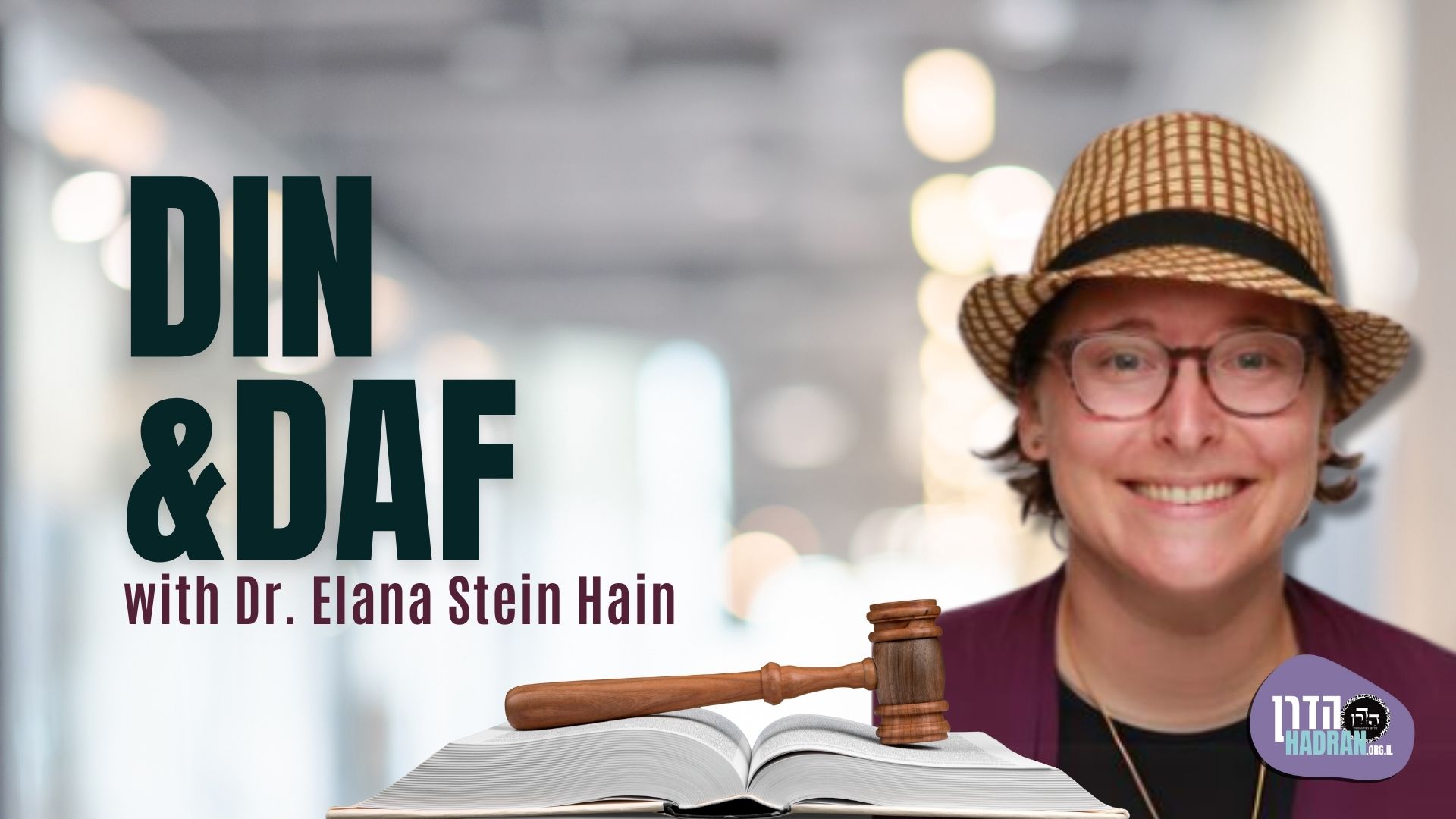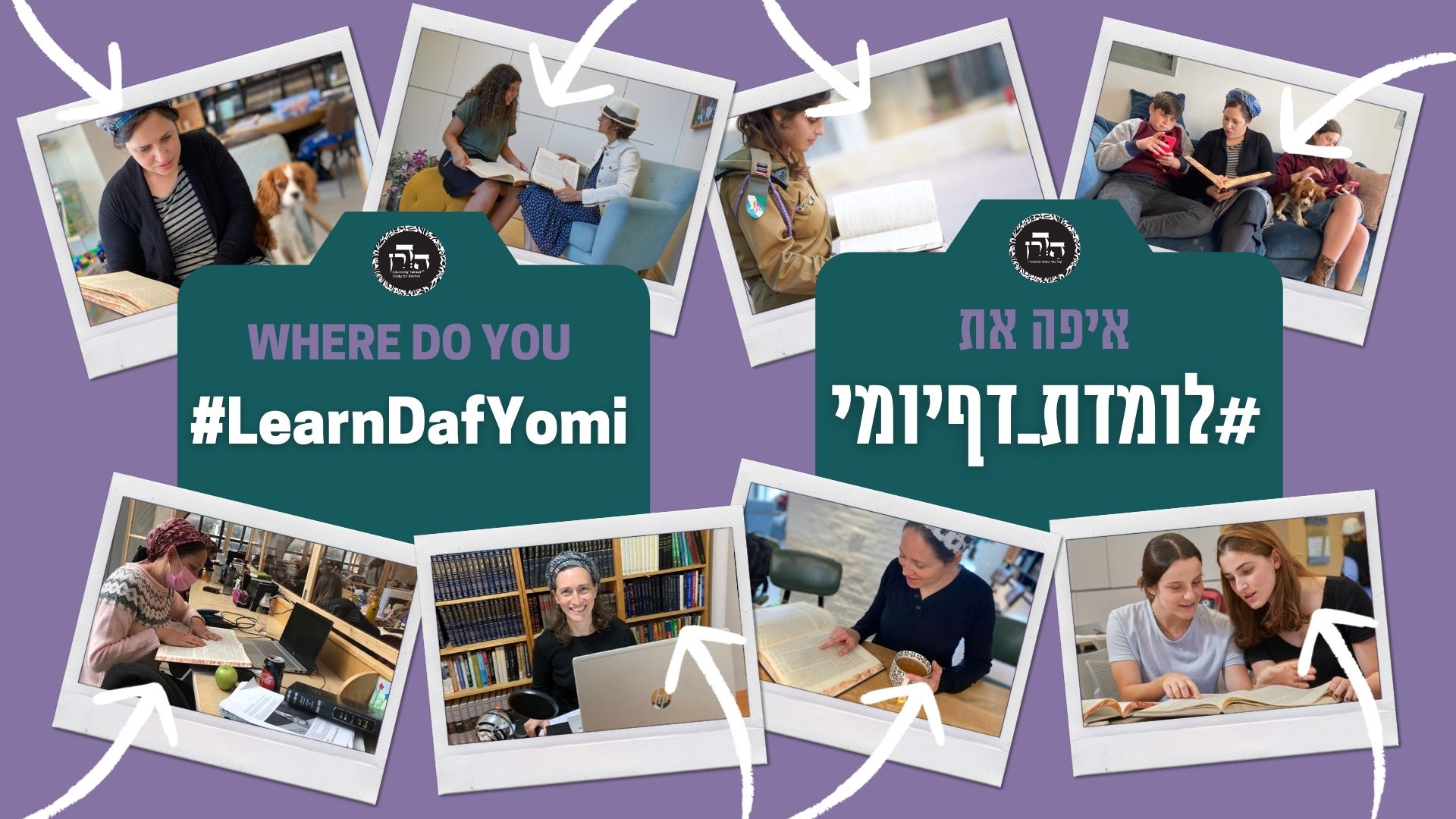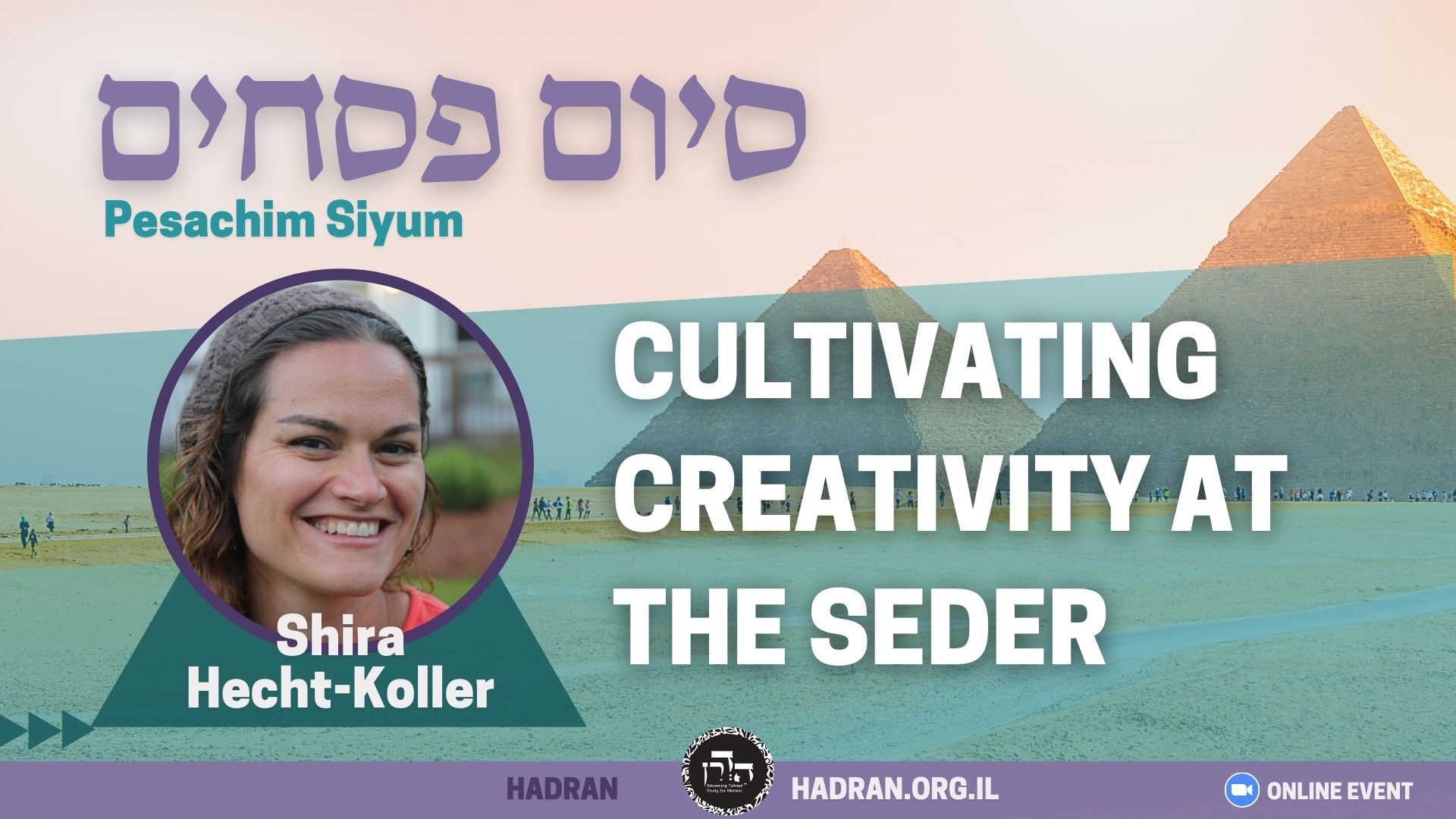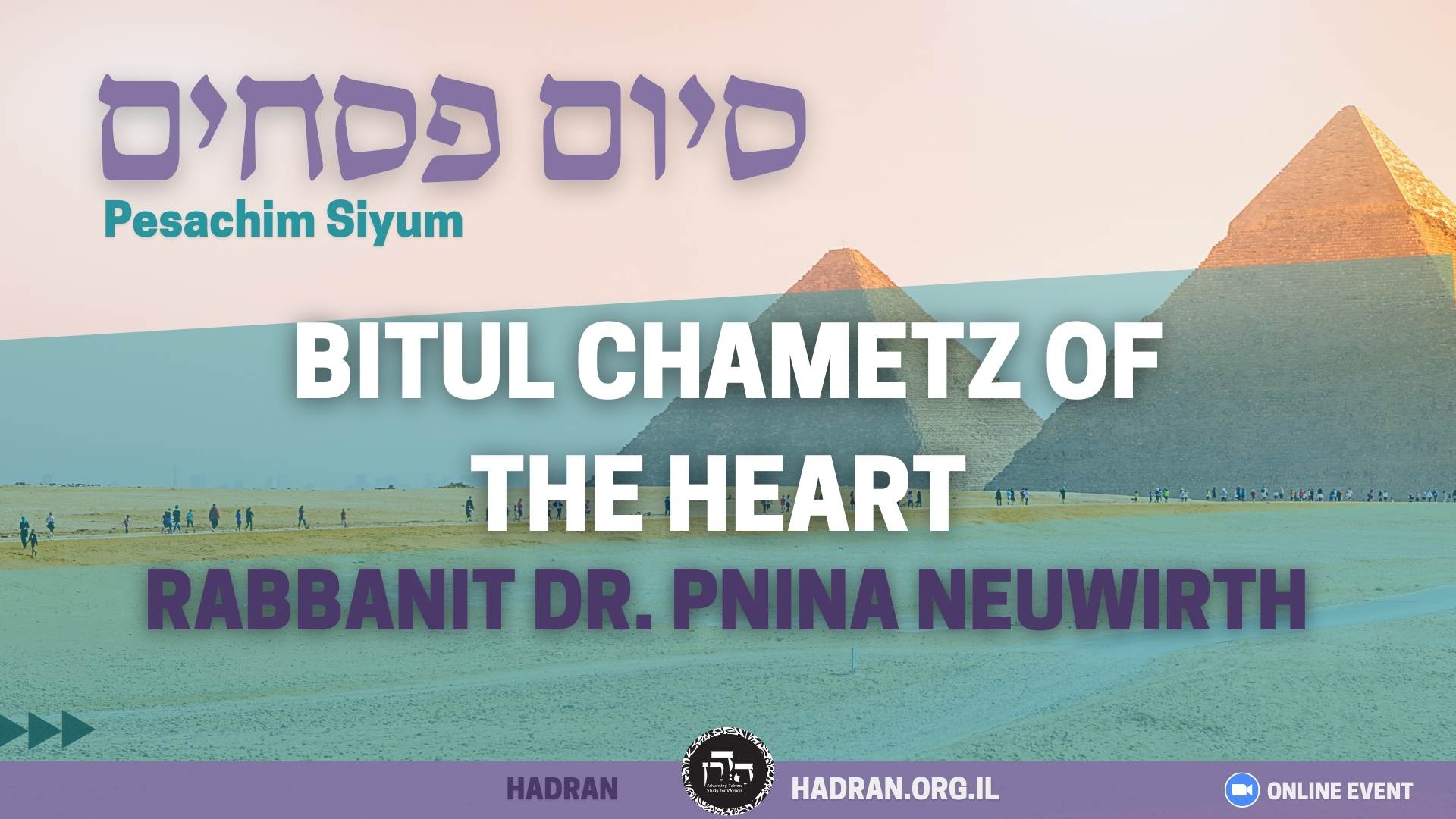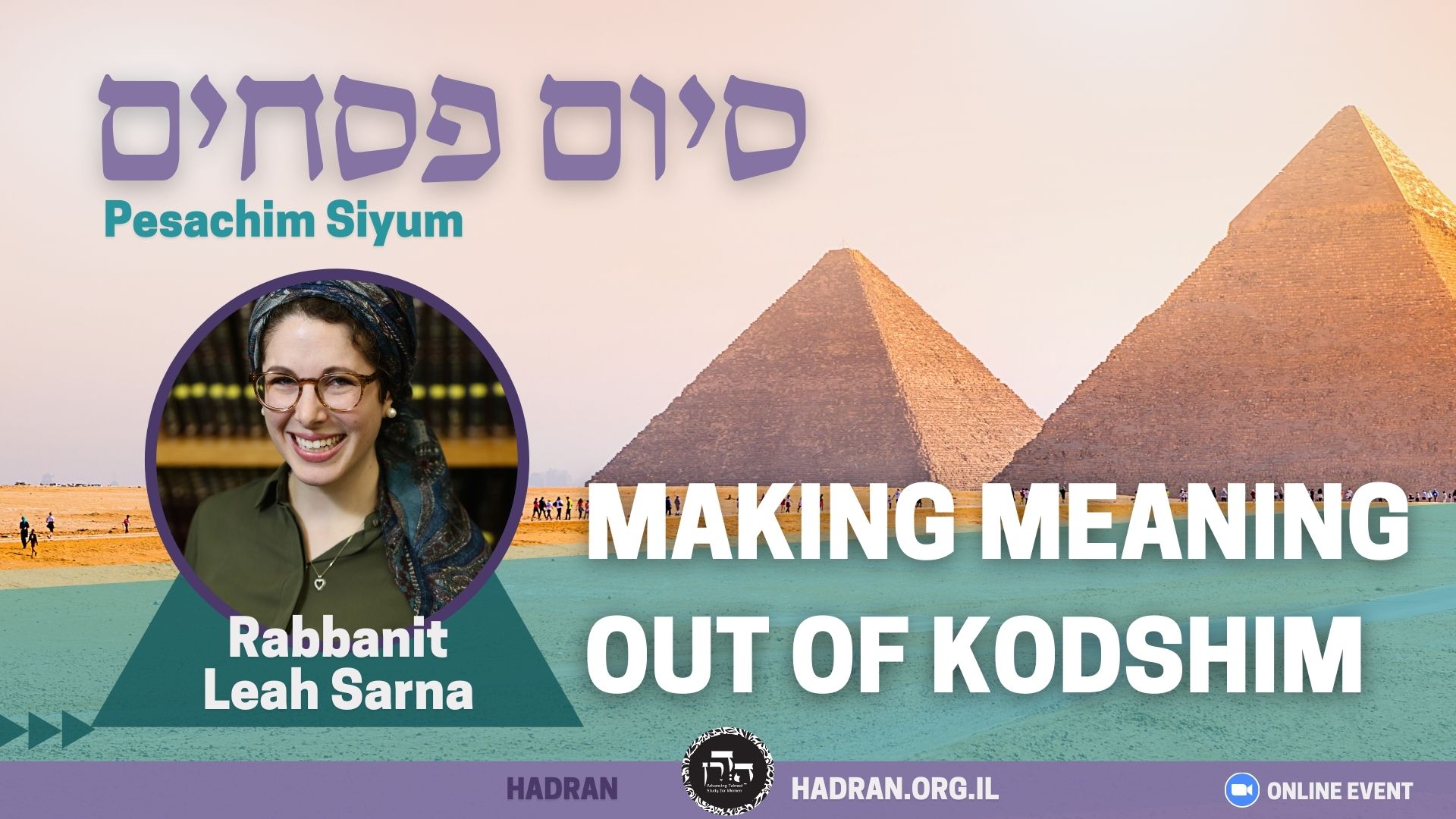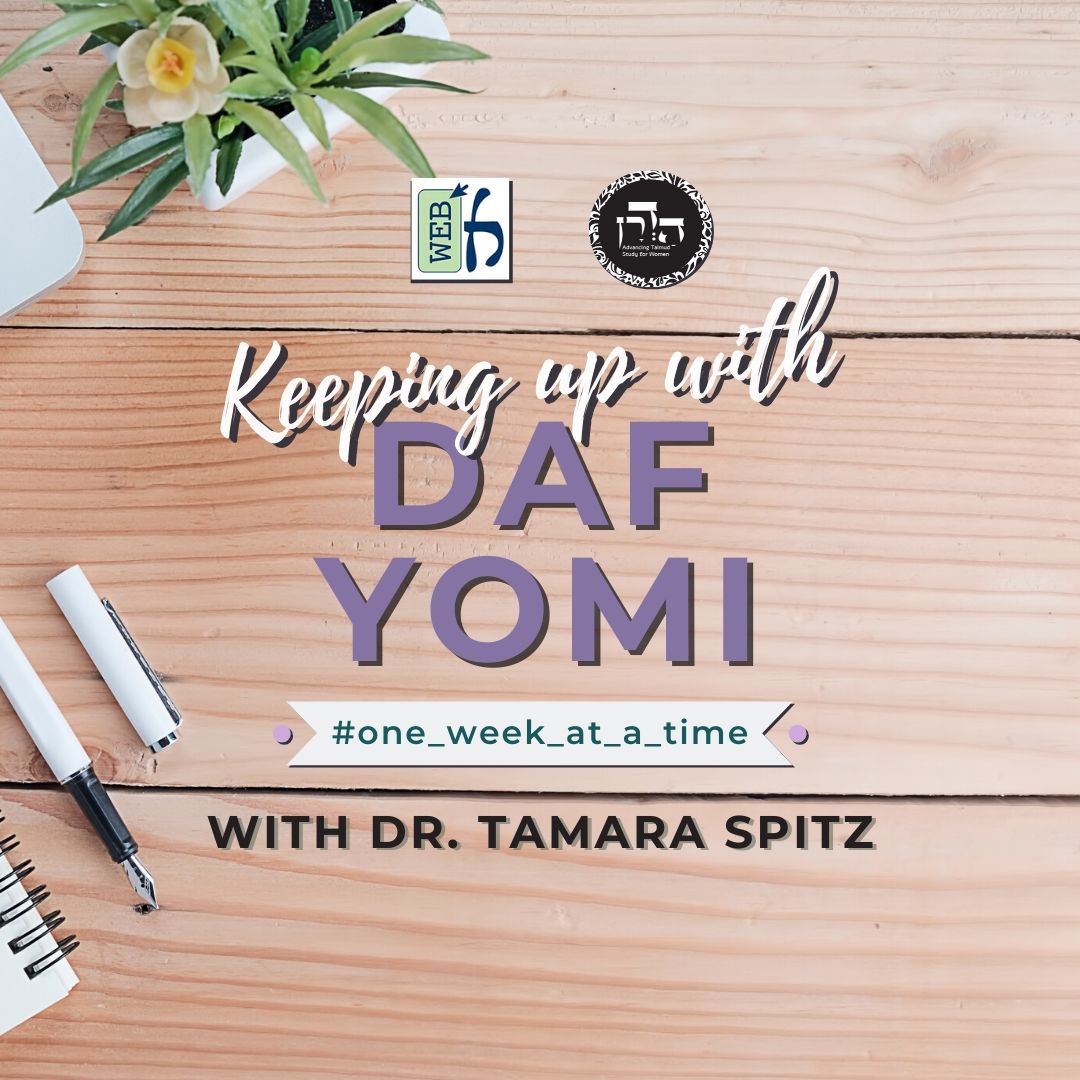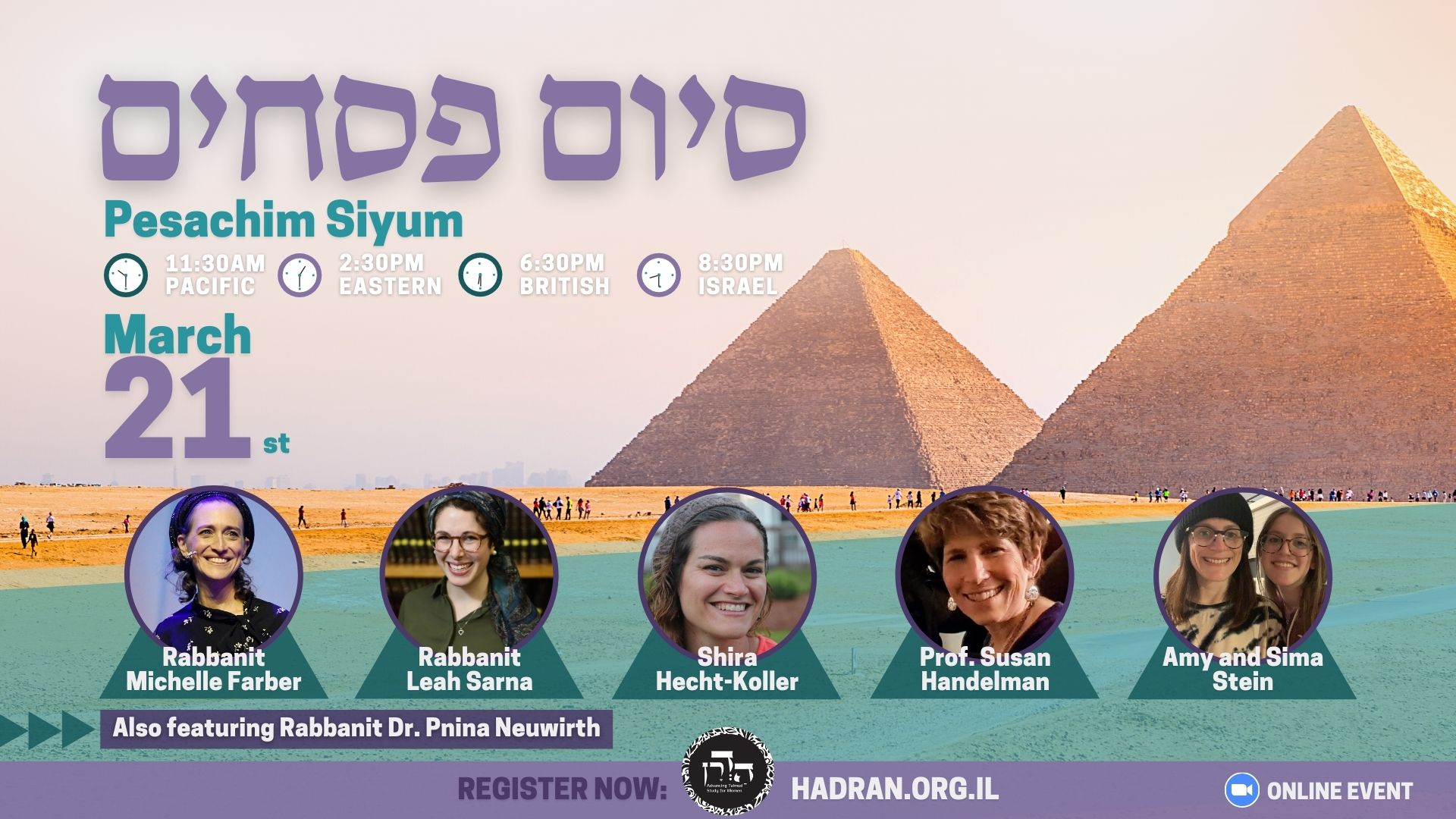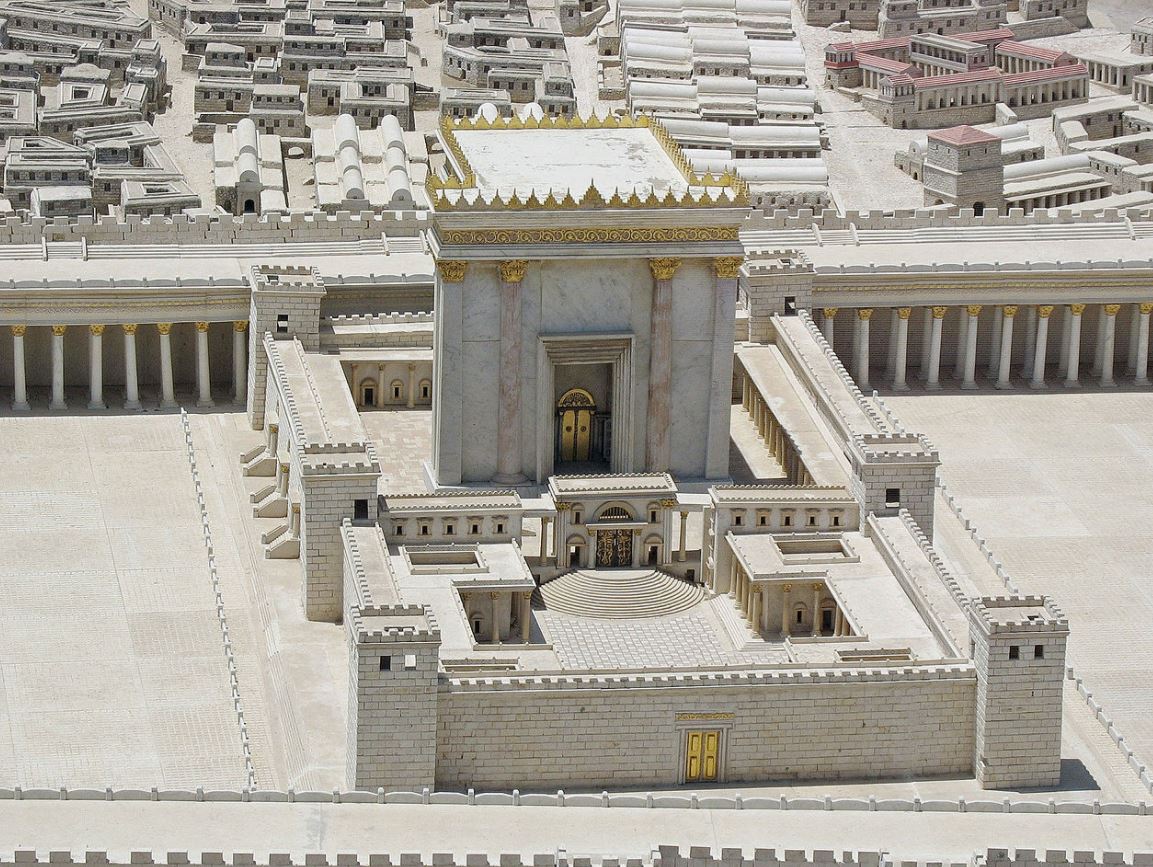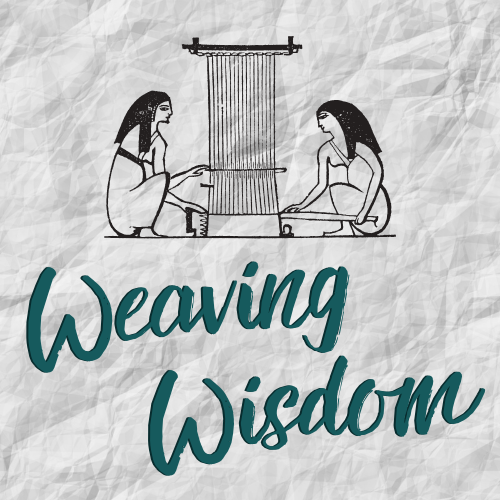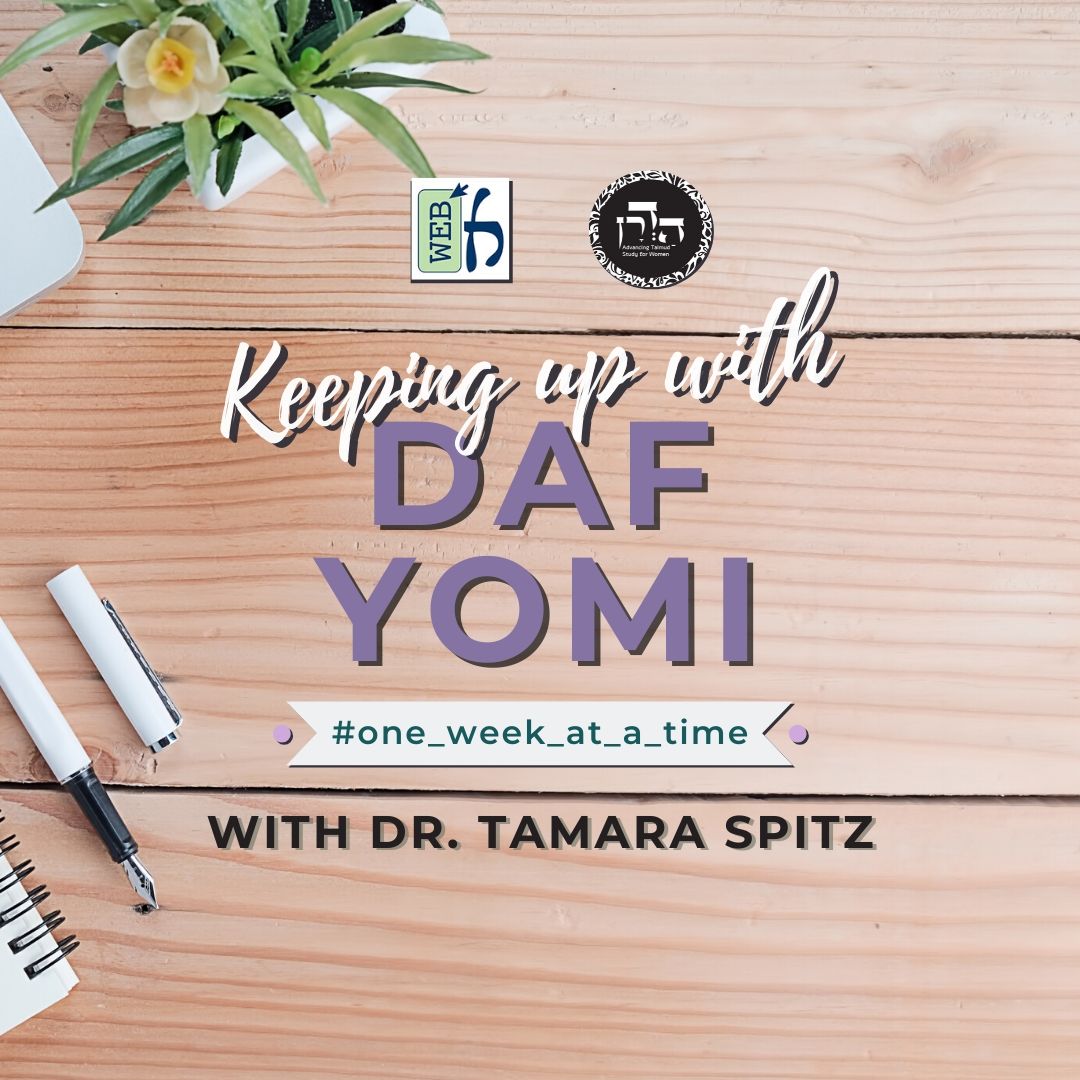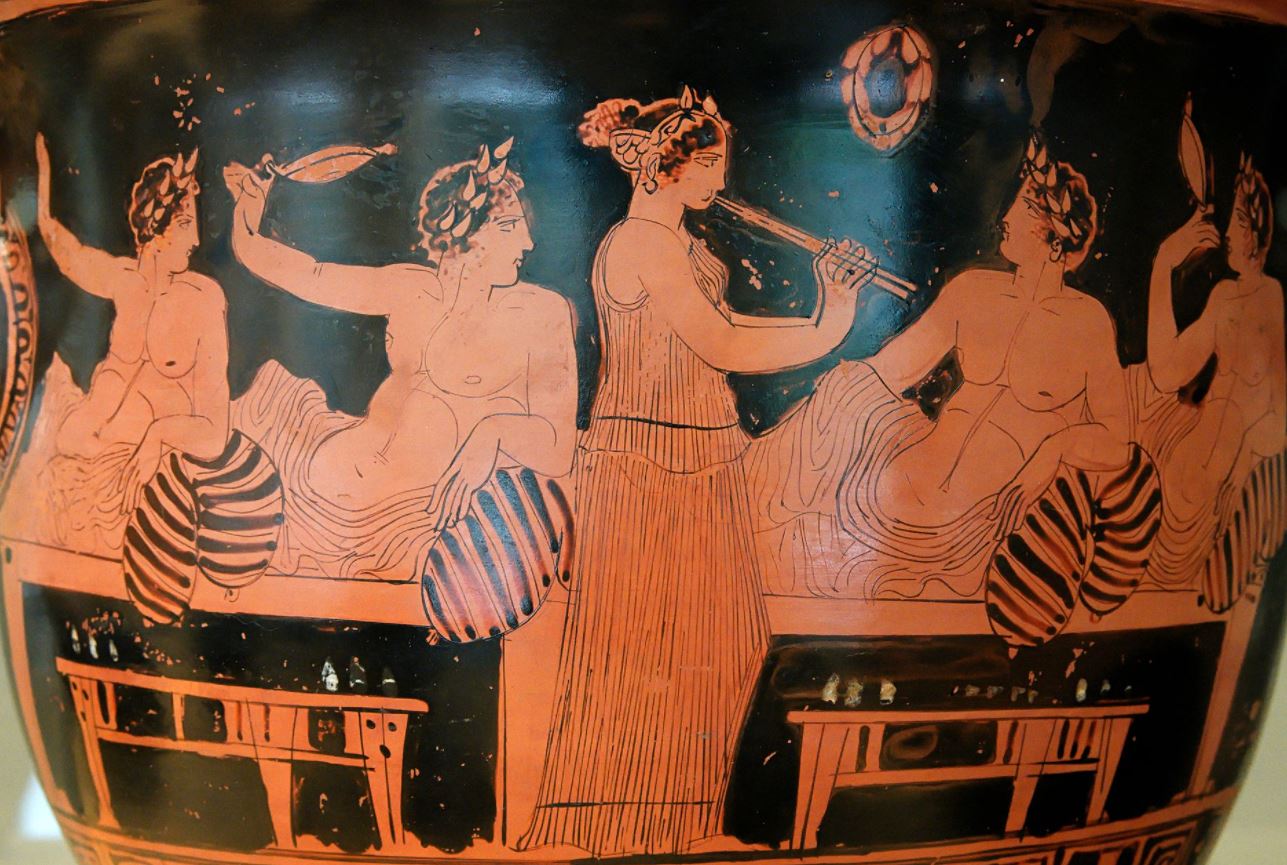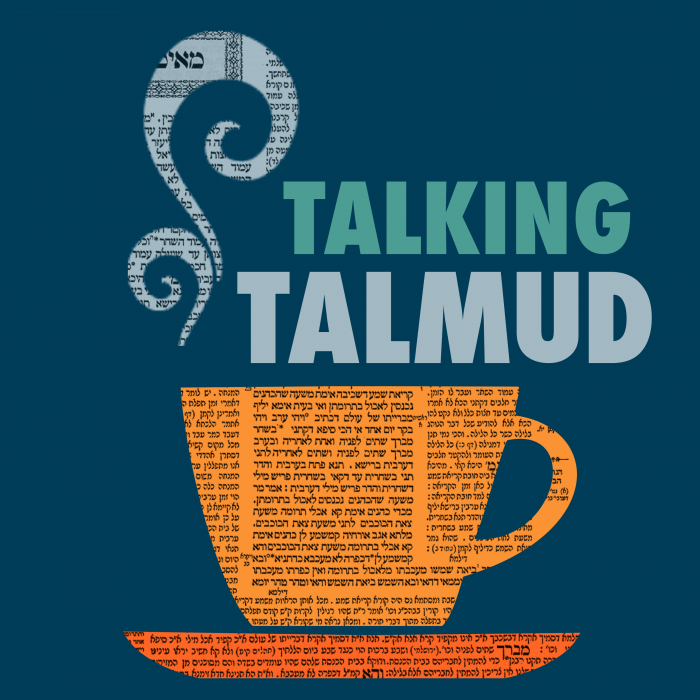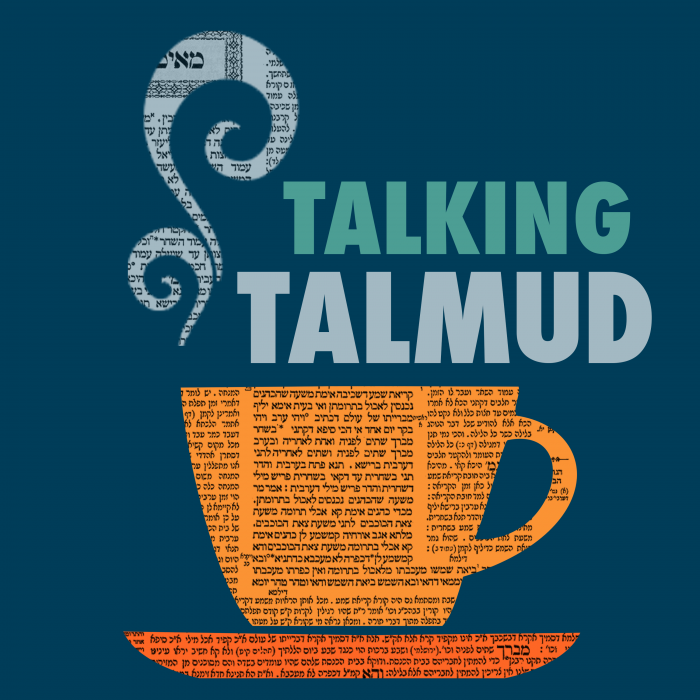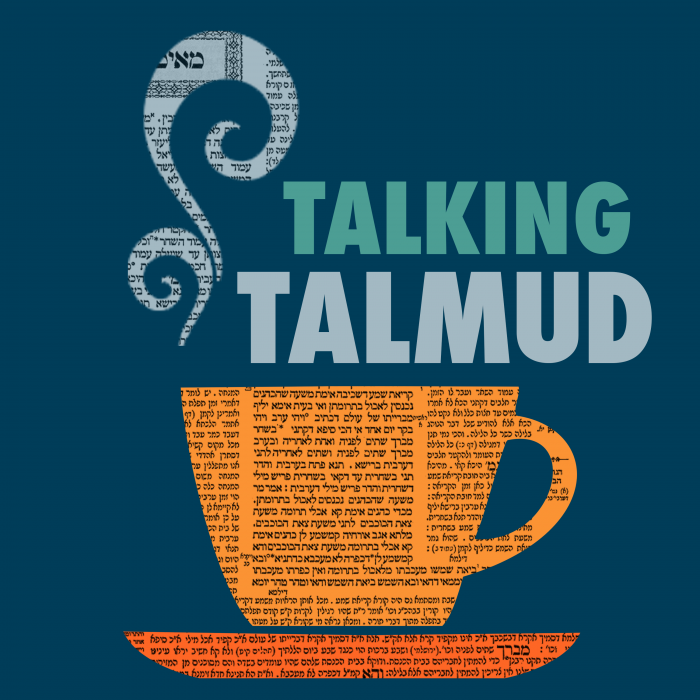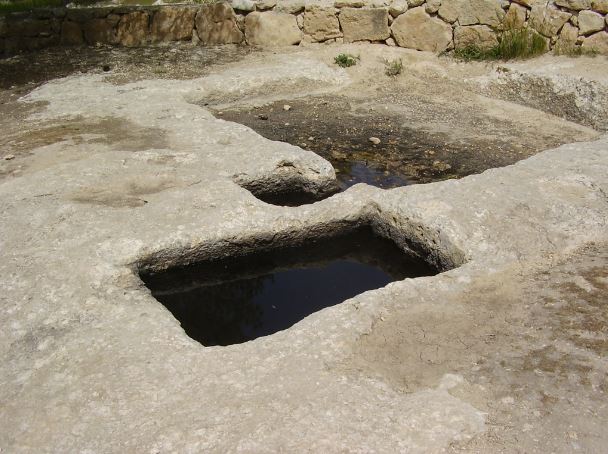How did Rabban Gamliel roast the Passover on a metal rack if it is written in the mishna that it is forbidden? The gemara explains that the rack he used was different. If you heat up an oven with orla branches and sweep them away and bake a bread in the oven, is it considered gaining benefit from the forbidden orla? No! But how does this fit in with a braita that says that the Passover sacrifice cannot be roasted in that way (in an oven after the coals were swept aside) because it says twice in the verse roasted on a fire. From there one can derive that only because the verse specified, but otherwise it would be considered roasting. The gemara brings two answers. Rebbi says that the Passover sacrifice can be roasted over coals. Is putting it on coals considered a fire? The gemara brings a contradictory braita which learns from a verse about leprosy that fire would not include coals were it not for a drasha. There are two resolutions – one distinguishes between a coal from a tree (wood) and a coal of a metal. The gemara then questions this by the death by the hands of the court known as burning which was performed by pouring molten lead down one’s throat. This seems to say “burning with fire” includes even a coal of a metal. The other resolution “corrects” the braita by leprosy to include the coal in the category of fire even without the drasha. Rava brings another contradiction to the words of Rebbi from a braita which also seems to indicate that coals are not considered fire. Abaye and Rava each reread the braita to answer the contradiction.
This week’s learning is sponsored for the merit and safety of Haymanut (Emuna) Kasau, who was 9 years old when she disappeared from her home in Tzfat two years ago, on the 16th of Adar, 5784 (February 25, 2024), and whose whereabouts remain unknown.
This week’s learning is dedicated of the safety of our nation, the soldiers and citizens of Israel, and for the liberation of the Iranian people. May we soon see the realization of “ליהודים היתה אורה ושמחה וששון ויקר”.
Want to dedicate learning? Get started here:


Today’s daily daf tools:
This week’s learning is sponsored for the merit and safety of Haymanut (Emuna) Kasau, who was 9 years old when she disappeared from her home in Tzfat two years ago, on the 16th of Adar, 5784 (February 25, 2024), and whose whereabouts remain unknown.
This week’s learning is dedicated of the safety of our nation, the soldiers and citizens of Israel, and for the liberation of the Iranian people. May we soon see the realization of “ליהודים היתה אורה ושמחה וששון ויקר”.
Today’s daily daf tools:
Delve Deeper
Broaden your understanding of the topics on this daf with classes and podcasts from top women Talmud scholars.
New to Talmud?
Check out our resources designed to help you navigate a page of Talmud – and study at the pace, level and style that fits you.
The Hadran Women’s Tapestry
Meet the diverse women learning Gemara at Hadran and hear their stories.
Pesachim 75
לְקִיּוּהָא דְפֵירָא בְּעֵינֵיהּ. הָכָא — לֵיתָא לְקִיּוּהָא דְפֵירָא בְּעֵינֵיהּ.
sharpness of the fruit remains present in the vinegar in its pure, unadulterated form, despite the fact that the vinegar itself is not sharp. Here, the sharpness of the fruit does not remain present in the vinegar in its pure, unadulterated form because it has already been used with the meat. Therefore, the vinegar is no longer potent enough to keep the blood in the meat.
אֵין צוֹלִין אֶת הַפֶּסַח וְכוּ׳. מַעֲשֶׂה לִסְתּוֹר?! חַסּוֹרֵי מִיחַסְּרָא, וְהָכִי קָתָנֵי: וְאִם אַסְכָּלָא מְנוּקֶּבֶת — מוּתָּר. וְאָמַר רַבִּי צָדוֹק, מַעֲשֶׂה בְּרַבָּן גַּמְלִיאֵל שֶׁאָמַר לְטָבִי עַבְדּוֹ: צֵא וּצְלֵה לָנוּ אֶת הַפֶּסַח עַל הָאַסְכָּלָא מְנוּקֶּבֶת.
It was taught in the mishna that one may not roast the Paschal lamb on a grill. Subsequently, the mishna quotes an incident in which Rabban Gamliel instructed his servant to roast the Paschal lamb for him on a grill. The Gemara expresses surprise: Was an incident cited to contradict what was previously stated? The Gemara responds: The mishna is incomplete and is teaching the following: And if it is a perforated grill, so that the fire reaches each part of the meat and the animal will not be roasted from the heat of the grill itself, it is permitted. And with regard to this Rabbi Tzadok said that there was an incident with Rabban Gamliel, who said to his slave Tavi: Go and roast the Paschal lamb for us on the perforated grill.
בְּעָא מִינֵּיהּ רַב חִינָּנָא בַּר אִידִי מֵרַב אַדָּא בַּר אַהֲבָה: תַּנּוּר שֶׁהִסִּיקוֹ בִּקְלִיפֵּי עׇרְלָה וּגְרָפוֹ וְאָפָה בּוֹ אֶת הַפַּת, לְדִבְרֵי הָאוֹסֵר, מַהוּ? אֲמַר לֵיהּ: הַפַּת מוּתֶּרֶת.
The Gemara cites a discussion related to the subject of roasting the Paschal lamb. Rav Ḥinnana bar Idi raised a dilemma before Rav Adda bar Ahava: In the case of an oven that one fired with peels of fruit that are orla, i.e., fruit that grows on a tree the first three years after it was planted, from which one may not receive any benefit, if, after the oven became very hot, he swept it and removed the fuel and the ashes, and he baked bread in it, according to the opinion that prohibits bread baked directly with heat from orla fuel, what is the halakha with regard to this bread? It was baked with the heat trapped in the oven only after the fuel was removed. He said to him: The bread is permitted.
אֲמַר לֵיהּ: וְהָאָמַר רַב חִינָּנָא סָבָא אָמַר רַבִּי אַסִּי אָמַר רַבִּי יוֹחָנָן: תַּנּוּר שֶׁהִסִּיקוֹ וּגְרָפוֹ וְצָלָה בּוֹ אֶת הַפֶּסַח — אֵין זֶה צְלִי אֵשׁ, שֶׁנֶּאֱמַר ״צְלִי אֵשׁ … צְלִי אֵשׁ״, שְׁתֵּי פְעָמִים.
Rav Ḥinnana said to him: But didn’t Rav Ḥinnana the Elder say that Rabbi Asi said that Rabbi Yoḥanan said: If there is an oven that one fired and swept so that the heat remains but there is no longer any fire in the oven, and one then roasted the Paschal lamb in it, this is not a fulfillment of the Torah’s command that the Paschal lamb must be roasted in fire, as it is stated in the Torah: “And they shall eat the meat on that night, roasted in fire, and matzot; with bitter herbs they shall eat it. Do not eat of it raw, nor boiled in water, but roasted in fire; its head with its legs and with its inner parts” (Exodus 12:8–9), and since it says the phrase: Roasted in fire, two times, the verse emphasizes that the Paschal lamb must literally be roasted on the fire?
טַעְמָא דְּגַלִּי רַחֲמָנָא ״צְלִי אֵשׁ״ ״צְלִי אֵשׁ״ שְׁתֵּי פְעָמִים. הָא לָא גַּלִּי רַחֲמָנָא, הֲוֵי אָמֵינָא צְלִי אֵשׁ הוּא.
The following can now be inferred: The reason is specifically because the Merciful One reveals this halakha with regard to the Paschal lamb in the Torah by repeating: Roasted in fire, roasted in fire, twice. But if the Merciful One had not revealed this halakha by emphasizing the need to roast it directly on the fire, I would have said a Paschal lamb roasted in an oven that has already been swept is nonetheless considered roasted in fire. Therefore, in other situations in which something is roasted in an oven, even if it is not roasted directly from the heat of a fire, its status should be comparable to something that was roasted directly from the fuel. If the fuel is forbidden, the food should be forbidden.
אֲמַר לֵיהּ: גַּלִּי רַחֲמָנָא הָתָם, וְיָלְפִינַן מִינַּהּ.
Rav Adda bar Ahava said to Rav Ḥinnana bar Idi: The Merciful One reveals it there, with regard to the Paschal lamb, and we learn from it that even in other areas of halakha, only something that is roasted directly by a fire is considered roasted in fire.
וְאִי בָּעֵית אֵימָא: הָתָם טַעְמָא דִּכְתַב רַחֲמָנָא ״צְלִי אֵשׁ״ שְׁתֵּי פְעָמִים, הָא לָא כְּתַב רַחֲמָנָא ״צְלִי אֵשׁ״ שְׁתֵּי פְעָמִים, הֲוָה אָמֵינָא: אַאֵשׁ קָפֵיד רַחֲמָנָא, וַאֲפִילּוּ גְּרָפוֹ נָמֵי — צְלִי אֵשׁ הוּא. אֲבָל הָכָא, אַעֵצִים דְּאִיסּוּרָא קָא קָפֵיד רַחֲמָנָא, וְהָא לֵיתַנְהוּ.
And if you wish, say a different answer instead: There, in the case of the Paschal lamb, the reason one may not roast the lamb if one has already swept out the oven is that the Merciful One writes “roasted in fire” twice. But if the Merciful One had not written “roasted in fire” twice, I would have said that the Merciful One is particular about fire, meaning that the source of the heat in the oven should be fire, and even if one swept it, it is still considered roasted in fire. It was therefore necessary to repeat the phrase “roasted in fire.” But here, in the case of orla, the Merciful One is particular about the prohibited fuel, and it is not here in the oven. Therefore, there is no reason to prohibit the bread.
תָּנוּ רַבָּנַן: חֲתָכוֹ, וּנְתָנוֹ עַל גַּבֵּי גֶּחָלִים. רַבִּי אוֹמֵר: אוֹמֵר אֲנִי שֶׁזֶּה צְלִי אֵשׁ. רָמֵי לֵיהּ רַב אַחָדְבוּי בַּר אַמֵּי לְרַב חִסְדָּא: מִי אָמַר רַבִּי גֶּחָלִים אֵשׁ נִינְהוּ?
The Sages taught: If one cuts the Paschal lamb superficially in several places and places it on coals, Rabbi Yehuda HaNasi says: I say that this is considered roasted in fire, as coals have the status of real fire. Rav Aḥadvoi bar Ami raised a contradiction to Rav Ḥisda: Did Rabbi Yehuda HaNasi actually say that coals are considered like fire?
וּרְמִינְהוּ ״מִכְוַת אֵשׁ״, אֵין לִי אֶלָּא שֶׁנִּכְוָה בְּאֵשׁ, נִכְוָה בְּגַחֶלֶת, בְּרֶמֶץ, בְּסִיד רוֹתֵחַ, בְּגִפְסִיס רוֹתֵחַ, וְכׇל דָּבָר הַבָּא מִן הָאוּר, לְאֵיתוֹיֵי חַמֵּי הָאוּר, מִנַּיִין? תַּלְמוּד לוֹמַר: ״מִכְוָה״ ״מִכְוָה״ רִיבָּה.
Rav Aḥadvoi bar Ami raised a contradiction based on the Torah’s statement with regard to the laws of leprosy: “Or flesh that shall have on its skin a burn from fire” (Leviticus 13:24). From the fact that it says a burn from fire, I have derived nothing other than a case in which it is burned by fire itself; if it is burned by a coal, by burning ash, by burning lime, by burning plaster [gipsis], or by anything else that is burning and whose source of heat comes from fire, to include also water heated by fire, from where is it derived that these are also considered a burn from fire? The verse states: A burn, a burn, twice. By repeating the term, it includes all these types of burns.
טַעְמָא דְּרַבִּי רַחֲמָנָא ״מִכְוָה״ ״מִכְוָה״, הָא לָא רַבִּי רַחֲמָנָא ״מִכְוָה״ ״מִכְוָה״, גֶּחָלִים לָאו אֵשׁ נִינְהוּ!
The following can now be inferred: The reason is that the Merciful One includes these types of burns in the Torah through the words: A burn, a burn. But if the Merciful One had not included them through the repetitive expression a burn, a burn, one would have assumed that coals are not considered fire, which contradicts the opinion of Rabbi Yehuda HaNasi that any usage of the term fire includes coals as well.
אֲמַר לֵיהּ: גַּחֶלֶת שֶׁל עֵץ לָא אִיצְטְרִיךְ קְרָא לְרַבּוֹיֵי. כִּי אִיצְטְרִיךְ קְרָא לְגַחֶלֶת שֶׁל מַתֶּכֶת.
He said to him: With regard to a red-hot wood coal, it is not necessary for the verse to include it. As long as it is burning, it is certainly considered a fire. Where a verse is necessary is with regard to a red-hot piece of metal that was heated by a fire. Without the verse, it would have been possible to think a person burned by hot metal it is not considered burned by fire.
וְגֶחָלִים שֶׁל מַתֶּכֶת לָאו אֵשׁ הוּא? וְהָא גַּבֵּי בַּת כֹּהֵן, דִּכְתִיב: ״בָּאֵשׁ תִּשָּׂרֵף״. וְאָמַר רַב מַתְנָה: פְּתִילָה שֶׁל אֲבָר הָיוּ עוֹשִׂין לָהּ!
The Gemara expresses surprise at the previous answer: And are red-hot pieces of metal not considered fire? But with regard to a daughter of a priest who committed adultery after betrothal, it is written: “And the daughter of a priest, if she profanes herself through adultery, she profanes her father; in fire she shall be burned” (Leviticus 21:9), and Rav Mattana said: They would not literally burn her in fire; rather, they would prepare for her a molten bar of lead. They would execute her by pouring molten lead down her throat. This proves that burning metal is considered fire.
שָׁאנֵי הָתָם, דְּאָמַר קְרָא: ״בָּאֵשׁ תִּשָּׂרֵף״, ״תִּשָּׂרֵף״ — לְרַבּוֹת כׇּל שְׂרֵיפוֹת הַבָּאוֹת מִן הָאֵשׁ.
The Gemara responds: It is different there, as the verse states not simply fire, but “in fire she shall be burned.” The expression “she shall be burned” comes to include all burnings that come from fire.
וְכׇל שֶׁכֵּן אֵשׁ עַצְמָהּ. וְנַקֵּיף לַהּ חֲבִילֵי זְמוֹרוֹת וְנִקְלַהּ! אָתְיָא ״שְׂרֵיפָה״ ״שְׂרֵיפָה״ מִבְּנֵי אַהֲרֹן. מָה לְהַלָּן — שְׂרֵיפַת נְשָׁמָה וְגוּף קַיָּים, אַף כָּאן — שְׂרֵיפַת נְשָׁמָה וְגוּף קַיָּים.
The Gemara suggests: If so, all the more so fire itself fulfills the requirement of burning. Let us surround her with bundles of branches and burn her with them. The Gemara responds: It comes from a verbal analogy between the word “burning” stated here and the word “burning” stated and in the context of the death of the sons of Aaron: Just as below, with regard to the sons of Aaron, the verse states that they were burned with fire (see Leviticus 10:2), and it was a burning of the soul and the body remained, as even their clothes were not burned, so too, here, with regard to the daughter of a priest, it means the burning of the soul and the body remains.
וְנַעְבֵּיד לַהּ חַמֵּי הָאוּר? מִשּׁוּם דְּרַב נַחְמָן, דְּאָמַר רַב נַחְמָן: אָמַר קְרָא: ״וְאָהַבְתָּ לְרֵעֲךָ כָּמוֹךָ״, בְּרוֹר לוֹ מִיתָה יָפָה.
The Gemara challenges: Let us execute her with boiling water heated by fire. The Gemara answers: It is due to the statement of Rav Naḥman, as Rav Naḥman said that the verse states: “And you shall love your fellow as yourself” (Leviticus 19:18). When executing someone, select for him a kind death. Even when someone must be executed, his dignity should be protected. He should be executed in the most comfortable way possible.
וְכִי מֵאַחַר דְּאִיכָּא רַב נַחְמָן, גְּזֵירָה שָׁוָה לְמָה לִי? אָמְרִי: אִי לָאו גְּזֵירָה שָׁוָה, הֲוָה אָמֵינָא: שְׂרֵיפַת נְשָׁמָה וְגוּף קַיָּים — לָאו שְׂרֵיפָה הִיא. וְאִי מִשּׁוּם דְּרַב נַחְמָן — נַיפֵּושׁ לַהּ חֲבִילֵי זְמוֹרוֹת טוּבָא, כִּי הֵיכִי דִּתְמוּת בַּעֲגָלָא, קָא מַשְׁמַע לַן.
The Gemara asks: Once there is the reason of Rav Naḥman, why do I need the verbal analogy derived from the sons of Aaron? Even without it, Rav Naḥman’s ruling requires the court to carry out the execution with molten lead, which provides an easier death. Say in answer to this question: If not for the verbal analogy, I would have said that burning the soul while the body remains is not considered burning. And if it were only due to the statement of Rav Naḥman that one must select a kind death, we should add many bundles of branches so that she would die quickly. Therefore, the verbal analogy teaches us that executing with molten lead is considered burning.
וְאֶלָּא ״בָּאֵשׁ״ לְמָה לִי? לְאַפּוֹקֵי אֲבָר מֵעִיקָּרוֹ.
But if it so that the verse says “she shall be burned” to include all methods of burning, for what do I need the expression “in fire”? The Gemara answers: To exclude lead from its source.
אֲמַר לֵיהּ רַבִּי יִרְמְיָה לְרַבִּי זֵירָא: וְכֹל הֵיכָא דִּכְתִיב ״בָּאֵשׁ תִּשָּׂרֵף״, לְרַבּוֹת כׇּל שְׂרֵיפוֹת הַבָּאוֹת מֵחֲמַת אֵשׁ הוּא? וְהָא גַּבֵּי פָּרִים הַנִּשְׂרָפִים, דִּכְתִיב בְּהוּ: ״וְשָׂרַף אֹתוֹ עַל עֵצִים בָּאֵשׁ״, וְתַנְיָא: ״בָּאֵשׁ״ וְלֹא בְּסִיד רוֹתֵחַ, וְלֹא בְּגִפְסִיס רוֹתֵחַ?
Rabbi Yirmeya said to Rabbi Zeira: Is it true that anywhere that it is written: “In fire she shall be burned” it comes to include all methods of burning that come from fire? But what of bulls that are burned, about which it is written: “And he shall burn it on wood in fire, where the ash is poured it shall be burned” (Leviticus 4:12), and it was taught in a baraita: In fire, and not in burning lime and not in burning plaster? Why aren’t all methods of burning permitted in this case as well?
אֲמַר לֵיהּ: הָכִי הַשְׁתָּא?! הָתָם כְּתִיב ״בָּאֵשׁ״ וַהֲדַר ״תִּשָּׂרֵף״ — לְרַבּוֹת כׇּל שְׂרֵיפוֹת הַבָּאוֹת מֵחֲמַת הָאֵשׁ. הָכָא כְּתִיב ״וְשָׂרַף אֹתוֹ עַל עֵצִים בָּאֵשׁ״ לְבַסּוֹף ״אֵשׁ״, לְמֵימְרָא דְּאֵשׁ — אִין, מִידֵּי אַחֲרִינָא — לָא.
He said to him: How can these cases be compared? There, in the case of the daughter of a priest, it is written: “In fire,” and the verse subsequently states that she shall be burned, which comes to include all methods of burning that come from fire. Here, in the case of a bull, it is written: “And he shall burn it on wood in fire.” At the end it says fire, to say that with regard to fire, yes, it may be used, but with regard to something else, no, it may not be used.
הָתָם נָמֵי כְּתִיבָא שְׂרֵיפָה לְבַסּוֹף, דִּכְתִיב:
The Gemara objects: There, too, with regard to bulls that are burned, burning is written at the end, as it is written at the end of that verse:
״עַל שֶׁפֶךְ הַדֶּשֶׁן יִשָּׂרֵף״! אָמְרִי: הָהוּא ״יִשָּׂרֵף״ מִיבְּעֵי לֵיהּ לְכִדְתַנְיָא: ״יִשָּׂרֵף״ — אַף עַל פִּי שֶׁאֵין שָׁם דֶּשֶׁן. ״יִשָּׂרֵף״ — אַף עַל פִּי שֶׁהִצִּית הָאוּר בְּרוּבּוֹ.
“Where the ash is poured it shall be burned” (Leviticus 4:12). The Gemara responds: Say: That usage of the expression “it shall be burned” is needed for that which was taught in a baraita: It shall be burned even though there is no ash there, as the presence of ash from the altar is not essential for burning the bulls. “It shall be burned” also teaches that although the fire has consumed most of it, that is not sufficient. One must take care to complete the burning process.
רָבִינָא אָמַר, כְּרוֹךְ וּתְנִי: ״מִכְוַת אֵשׁ״ — אֵין לִי אֶלָּא שֶׁנִּכְוָה בְּאֵשׁ וּבְגַחֶלֶת. נִכְוָה בְּרֶמֶץ, בְּסִיד רוֹתֵחַ, וּבְגִפְסִיס רוֹתֵחַ, וּבְכׇל דָּבָר הַבָּא מֵחֲמַת הָאוּר, לְאֵיתוֹיֵי חַמֵּי הָאוּר, מִנַּיִין? תַּלְמוּד לוֹמַר: ״מִכְוָה״ ״מִכְוָה״ רִיבָּה.
Ravina said that the contradiction cited earlier between Rabbi Yehuda HaNasi’s statement, that roasting over coal is considered roasting over fire, and the baraita, which requires a derivation to indicate that coal is considered fire with regard to leprosy, can be answered by changing the text of the baraita. Combine and teach the first two types of burns together. From the phrase “a burn from fire,” I have derived nothing other than a case in which one was burned by a fire or by a coal. With regard to one who is burned by hot ash, by burning lime, or by burning plaster, or by anything else that is burning and whose source of heat comes from fire, to include water heated by fire, from where is it derived that these cases are also considered a burn from fire? The verse states: A burn, a burn, twice. By repeating the term, it includes all these types of burns.
רָבָא רָמֵי. מִי אָמַר רַבִּי גֶּחָלִים אִיקְּרוּ אֵשׁ? וּרְמִינְהִי: ״גַּחֲלֵי״ — יָכוֹל עוֹמְמוֹת, תַּלְמוּד לוֹמַר: ״אֵשׁ״. אִי אֵשׁ — יָכוֹל שַׁלְהֶבֶת, תַּלְמוּד לוֹמַר: ״גַּחֲלֵי״. הָא כֵּיצַד? מֵבִיא מִן הַלּוֹחֲשׁוֹת. (אַלְמָא גֶּחָלִים לָא אִיקְּרִי אֵשׁ!
Rava raised a contradiction: Did Rabbi Yehuda HaNasi actually say that coals are called fire? And we raise a contradiction based on the verse: “And he shall take a pan full of burning coals from upon the altar before the Lord” (Leviticus 16:12). From the verse’s use of the word coals, I might have thought that one may bring smoldering coals, meaning that the fire is almost extinguished and is not noticeable from the outside. Therefore, the verse states: Fire. If it had stated only fire, I might have thought it was referring to a flame. Therefore, the verse states: Coals. How are these two requirements reconciled? One brings from the coals that are flickering, meaning that the fire is visible. Apparently, plain coals are not called fire.
אָמְרִי:) וְהָא גּוּפָא קַשְׁיָא, אָמְרַתְּ: ״גַּחֲלֵי״ — יָכוֹל עוֹמְמוֹת, אַלְמָא לוֹחֲשׁוֹת אֵשׁ נִינְהוּ, אֵימָא סֵיפָא: אִי אֵשׁ — יָכוֹל שַׁלְהֶבֶת, תַּלְמוּד לוֹמַר: ״גַּחֲלֵי״, אַלְמָא אֲפִילּוּ לוֹחֲשׁוֹת לָאו אֵשׁ נִינְהוּ.
Say in answer to this question: Isn’t this baraita itself difficult? You said: From the verse’s use of the word coals, I might have thought the verse is referring to coals that are smoldering. Apparently, it is clear that flickering coals are considered fire. Say the latter clause of that same baraita as follows: If it had stated only fire, I might have thought it was referring to a flame. Therefore, the verse states: Coals. Apparently, even flickering coals are not considered fire, and there is an internal contradiction in the baraita.
וְאָמַר רַב שֵׁשֶׁת, הָכִי קָתָנֵי: ״גַּחֲלֵי״ — יָכוֹל בֵּין עוֹמְמוֹת בֵּין לוֹחֲשׁוֹת, תַּלְמוּד לוֹמַר: ״אֵשׁ״. אִי אֵשׁ — יָכוֹל שַׁלְהֶבֶת, תַּלְמוּד לוֹמַר: ״גַּחֲלֵי״, הָא כֵּיצַד? מֵבִיא מִן הַלּוֹחֲשׁוֹת. מִכׇּל מָקוֹם גֶּחָלִים לָא אִיקְּרִי אֵשׁ, קַשְׁיָא לְרַבִּי!
And Rav Sheshet said, in order to resolve this contradiction: This is what the baraita is teaching: From the verse’s use of the word coals, I might have thought he can take whatever he wants, whether smoldering or flickering. Therefore, the Torah states: Fire. If it had stated only fire, I might have thought it was referring to a flame. Therefore, the verse states: Coals. How is this to be understood? He brings from the flickering coals. In any event, it is derived from here that coals, even if they are flickering, are not called fire. This poses a difficulty to the opinion of Rabbi Yehuda HaNasi, according to which coals are considered fire.
אָמַר אַבָּיֵי, תָּרֵיץ הָכִי: ״גַּחֲלֵי״ — יָכוֹל עוֹמְמוֹת וְלֹא לוֹחֲשׁוֹת, תַּלְמוּד לוֹמַר: ״אֵשׁ״. אִי אֵשׁ, יָכוֹל רָצָה שַׁלְהֶבֶת — יָבִיא, רָצָה גַּחֶלֶת — יָבִיא, תַּלְמוּד לוֹמַר: ״גַּחֲלֵי״. הָא כֵּיצַד? מֵבִיא מִן הַלּוֹחֲשׁוֹת.
Abaye said that the answer is as follows: Based on the word coals, I might have thought they must be smoldering and not flickering. Therefore, the verse states: Fire. If it had stated only fire, I might have thought that if one wanted a flame he may bring it, and if he wanted a coal he may bring it. Therefore, the Torah states: Coals. How is this to be understood? He brings from the flickering coals. According to this, it is clear that coals are considered fire, in accordance with the opinion of Rabbi Yehuda HaNasi.
אָמַר רַבָּה: רָצָה גַּחֶלֶת — יָבִיא, רָצָה שַׁלְהֶבֶת — יָבִיא. שַׁלְהֶבֶת בְּלֹא גַּחֶלֶת הֵיכִי מַשְׁכַּחַתְּ לַהּ? כְּגוֹן דְּשַׁפְיֵיהּ לְמָנָא מִשְׁחָא וְאַתְלִי בֵּיהּ נוּרָא. הָהוּא לְמָה לִי קְרָא לְמַעוֹטֵי, הַשְׁתָּא לִפְנֵי מֶלֶךְ בָּשָׂר וְדָם אֵין עוֹשִׂין כֵּן, לִפְנֵי מֶלֶךְ מַלְכֵי הַמְּלָכִים הַקָּדוֹשׁ בָּרוּךְ הוּא לֹא כׇּל שֶׁכֵּן!
Rabba said: In this last explanation, it was stated that one might have thought that if he wanted a coal he may bring it, and if he wanted a flame he may bring it. Under what circumstances can a flame without a coal be found? The Gemara answers: In a case where one smears a utensil with oil and lights it on fire. However, for a case like this, why do I need a verse to exclude it and indicate that one may not bring such a flame? Now, in front of a king of flesh and blood one does not do this, as it is considered disgraceful to bring such a flame before a king; in front of the King of kings, the Holy One, Blessed be He, is it not all the more so a disgrace? Therefore, the verse would not need to exclude this type of flame.
אֶלָּא אָמַר רָבָא, תָּרֵיץ הָכִי: ״גַּחֲלֵי״ — יָכוֹל עוֹמְמוֹת וְלֹא לוֹחֲשׁוֹת, תַּלְמוּד לוֹמַר: ״אֵשׁ״. אִי אֵשׁ — יָכוֹל יָבִיא מֶחֱצָה גַּחֶלֶת וּמֶחֱצָה שַׁלְהֶבֶת, אַדְּעָיֵיל לְגַוַּאי הָוֵי כּוּלֵּיהּ גַּחֶלֶת — תַּלְמוּד לוֹמַר: ״וְלָקַח מְלֹא הַמַּחְתָּה גַּחֲלֵי אֵשׁ מֵעַל הַמִּזְבֵּחַ״, מִשְּׁעַת לְקִיחָה נִיהְוֵי גֶּחָלִים.
Rather, Rava said that one should answer as follows: Based on the word coals, I might have thought they must be smoldering and not flickering; therefore, the verse states: Fire. If it had said only fire, I might have thought one should bring half coal and half fire, meaning that when one takes the coals from the altar they should be burning strongly and their flame should be visible, and by the time he enters the inside of the Holy of Holies the fire will die down and it will be all coal. Therefore, the verse states: “And he shall take a coal-pan full of burning coals from upon the altar” (Leviticus 16:12), which indicates that from the time of their taking they should be coals and not flames.
אִיבַּעְיָא לְהוּ: אוֹמְמוֹת אוֹ עוֹמְמוֹת? אָמַר רַבִּי יִצְחָק: ״אֲרָזִים לֹא עֲמָמֻהוּ בְּגַן אֱלֹהִים״.
Since the discussion until now has focused on smoldering coals, the Gemara mentions that a dilemma was raised before the Sages in the study hall about whether the word smoldering should be rendered omemot with an alef or omemot with an ayin. Rabbi Yitzḥak said: It should be rendered with an ayin, as it is stated: “The cedars in the garden of God could not hide it [amamuhu]” (Ezekiel 31:8), as the word amamuhu in the verse is spelled with an ayin.
מַתְנִי׳ נָגַע בְּחַרְסוֹ שֶׁל תַּנּוּר — יִקְלוֹף אֶת מְקוֹמוֹ. נָטַף מֵרוֹטְבּוֹ עַל הַחֶרֶס וְחָזַר אֵלָיו — יִטּוֹל אֶת מְקוֹמוֹ. נָטַף מֵרוֹטְבּוֹ עַל הַסּוֹלֶת — יִקְמוֹץ אֶת מְקוֹמוֹ.
MISHNA: If the Paschal lamb touched the earthenware surface of an oven, one must peel off its place on the Paschal lamb, as it was roasted by the heat of the oven and not by the fire itself. If some of the gravy of the Paschal lamb dripped on the earthenware and then returned to it, i.e., the gravy splattered back onto the meat, one must remove its place. Peeling off the outer layer is not enough, and one must remove some of the meat underneath the outer layer, because it is considered to have been cooked by the liquid rather than roasted by the fire. If some of the Paschal lamb’s gravy dripped onto hot flour, one must remove a handful of flour from its place, i.e., the place where the gravy landed in the flour, and destroy it.
סָכוֹ בְּשֶׁמֶן תְּרוּמָה, אִם חֲבוּרַת כֹּהֲנִים — יֹאכֵלוּ. אִם שֶׁל יִשְׂרָאֵל, אִם חַי הוּא — יְדִיחֶנּוּ. וְאִם צָלִי הוּא — יִקְלוֹף אֶת הַחִיצוֹן. סָכוֹ בְּשֶׁמֶן שֶׁל מַעֲשֵׂר שֵׁנִי — לֹא יַעֲשֶׂנּוּ דָּמִים עַל בְּנֵי חֲבוּרָה, שֶׁאֵין פּוֹדִין מַעֲשֵׂר שֵׁנִי בִּירוּשָׁלַיִם.
In a case where one smears the Paschal lamb with teruma oil, if the Paschal lamb belongs to a group of priests they may eat it, as they are permitted to eat teruma. If the Paschal lamb belongs to a group of Israelites, then if it is still raw, one must rinse it in order to remove the teruma oil; and if it is roasted, one must peel off the outer layer that has absorbed the oil, so that the Israelites do not eat the teruma, which is prohibited to them. If one smears the Paschal lamb with oil of the second tithe, he may not demand money for it from the members of the group, as one may not redeem second tithe in Jerusalem. Second-tithe produce that is in Jerusalem is meant to be eaten; it may be given as a gift to others, but may not be redeemed or sold.
גְּמָ׳ אִיתְּמַר: חַם לְתוֹךְ חַם — דִּבְרֵי הַכֹּל
GEMARA: Based on the mishna, the Gemara introduces a general discussion concerning the halakhot of forbidden foods that come into contact with other foods. It was stated that the amora’im disagreed with regard to these matters, but first the Gemara mentions the cases that are clear: If a hot food item falls into another hot item, e.g., hot meat falls into boiling milk or hot permitted meat falls into hot prohibited soup, all agree


